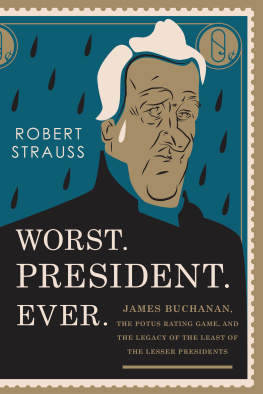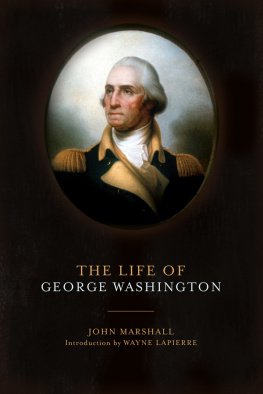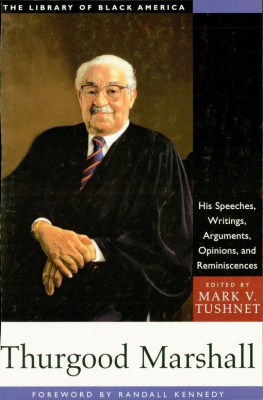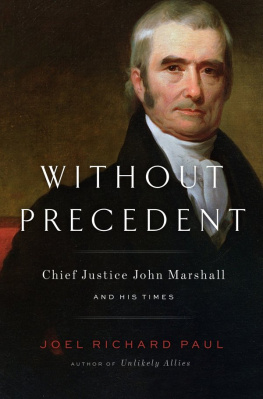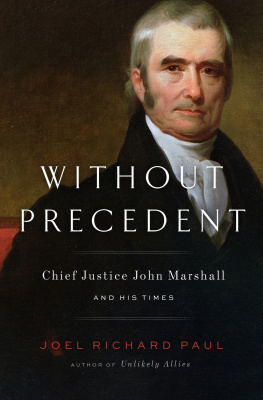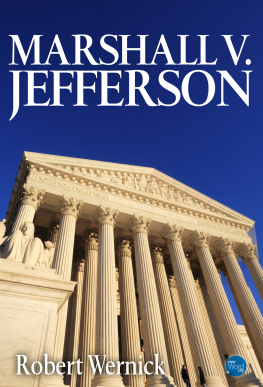BOOKS
Amar, Akhil Reed, and Alan Hirsch. For the People: What the Constitution Really Says About Your Rights. New York: Simon & Schuster, 1998.
Becker, Carl L. The Declaration of Independence: A Study in the History of Political Ideas. New York: Vintage, 1961.
Beveridge, Albert J. The Life of John Marshall. 4 volumes. Boston: Houghton Mifflin, 1916-1919.
Biskupic, Joan. The Chief: The Life and Turbulent Times of Chief Justice John Roberts. New York: Basic Books, 2019.
Black, Hugo Jr. My Father: A Remembrance. New York: Random House, 1975.
Boorstin, Daniel, ed. An American Primer. Chicago: University of Chicago Press, 1966.
Boorstin, Daniel. The Americans: The National Experience. New York: Random House, 1965.
Brookhiser, Richard. John Marshall: The Man Who Made the Supreme Court. New York: Basic Books, 2018.
Brooks, David L., ed. From Magna Carta to the Constitution: Documents in the Struggle for Liberty. San Francisco: Fox & Wilkes, 1993.
Carmon, Irin, and Shana Knizhnik. Notorious RBG, the Life and Times of Ruth Bader Ginsburg. New York: Dey Street Books, 2015.
Dillon, John F. Marshall: Life, Character, and Judicial Services. 3 volumes. Chicago: Callaghan, 1903.
Ellis, Joseph, J. American Creation. New York: Vintage, 2007.
Flexner, John Thomas. George Washington. 2 volumes. Boston: Little, Brown, 1970.
. Washington, The Indispensable Man. New York: Open Road Media edition, 2017.
Freeman, Douglas Southhall, John Alexander Carroll, and Mary Wells Ashworth. George Washington. 7 volumes. New York: Scribners, 1957.
Ginsburg, Ruth Bader. My Own Words. New York: Simon & Schuster, 2016.
Gorsuch, Neil. A Republic, If You Can Keep It. New York: Crown Forum, 2019.
Hamilton, Alexander, James Madison, and John Jay. The Federalist Papers (Mentor Book Edition) New York: Penguin, 1961.
Hemingway, Mollie, and Carrie Severino. Justice on Trial: The Kavanaugh Confirmation and the Future of the Supreme Court. Washington, DC: Regnery, 2019.
Irons, Peter. A Peoples History of the Supreme Court: The Men and Women Whose Cases and Decisions Have Shaped Our Constitution. New York: Viking, 1999.
Irving, Washington. Washington and His Country, Boston: Ginn and Company, 1889.
Isaacson, Walter. Benjamin Franklin: An American Life, New York: Simon & Schuster, 2003.
Kane, Joseph Nathan. Facts About the Presidents: A Compilation of Biographical and Historical Information. New York: H. W. Wilson, 1959.
Luxenberg, Steve. Separate: The Story of Plessy v. Ferguson, and Americas Journey from Slavery to Segregation. New York: W. W. Norton, 2019.
Marshall, John. The Life of George Washington, Philadelphia: C. P. Wayne, 180507.
. The Papers of John Marshall. Rhodes, Irwin R., ed. Norman: University of Oklahoma Press, 1969.
McCullough, David. John Adams. New York: Simon & Schuster, 2001.
. The Pioneers: The Heroic Story of the Settlers Who Brought the American Ideal West. New York: Simon & Schuster, 2019.
Meacham, Jon. The Soul of America: The Battle for Our Better Angels. New York: Random House, 2018.
OConnor, Sandra Day. Out of Order. New York: Random House, 2013.
Rehnquist, William H. The Supreme Court. New York: Knopf, 2004.
Rosen, Jeffrey. The Unwanted Gaze: The Destruction of Privacy in America. New York: Random House, 2000.
Rubenstein, David. The American Story: Conversations With Master Historians. New York: Simon & Schuster, 2019.
Saunders, Jason L., ed. Greek and Roman Philosophy after Aristotle. New York: The Free Press, 1966.
Scalia, Antonin. Scalia Speaks: Reflections on Law, Faith and Life Well Lived. New York: Crown Forum, 2017.
Schwartz, Bernard. A History of the Supreme Court. New York: Oxford University Press, 1993.
Schreck, Heidi. What the Constitution Means to Me. Theater on Broadway, performance seen by author in November 2019.
Smith, Jean Edward. John Marshall: Definer of a Nation. New York: Henry Holt, 1996.
Sotomayor, Sonia. My Beloved World. New York: Knopf, 2013.
Speiser, Stuart M. The Founding Lawyers and Americas Quest for Justice. Washington, DC: Pound Civil Justice Institute, 2010.
Stewart, David O. Madisons Gift: Five Partnerships that Built America. New York: Simon & Schuster, 2015.
Thomas, Clarence. My Grandfathers Son: A Memoir. New York: Harper, 2007.
Thomas, Evan. First: Sandra Day OConnor. New York: Random House, 2019.
Toobin, Jeffrey. The Nine: Inside the Secret World of the Supreme Court. New York: Anchor, 2008.
. The Oath: The Obama White House and The Supreme Court. New York: Anchor, 2012.
. Too Close to Call: The Thirty-Six Day Battle to Decide the 2000 Election. New York: Random House, 2001.
Trachtman, Michael G. The Supremes Greatest Hits: The 44 Supreme Court Cases That Most Directly Affect Your Life. New York: Sterling, 2009.
Tresolini, Rocco & Martin Shapiro. American Constitutional Law. New York, MacMillan, 1983.
Unger, Harlow Giles. John Marshall: The Chief Justice Who Saved the Nation. New York: Da Capo Press, 2014.
Winik, Jay. The Great Upheaval: America and the Birth of the Modern World, 1788-1800. New York: Harper, 2007.
Woodward, Bob, and Scott Armstrong. The Brethren: Inside the Supreme Court. New York: Simon & Schuster, 1979.
Zelden, Charles L. Bush v. Gore: Exposing the Hidden Crisis in American Democracy. Lawrence, Kansas: University Press of Kansas, 2010.
INTERVIEWS
Clark, Clifford, Professor of History emeritus, Carleton College. Personal interview with author, December 2019.
Denniston, Lyle, historian. Personal interview with author, January 2020.
Gerhardt, Michael, Samuel Ashe Distinguished Professor of Constitutional Law, University of North Carolina School of Law. Personal interview with author, December 2019.
Roosevelt, Kermit. University of Pennsylvania Law School. Personal interview with author, January 2016.
Stewart, David O., historian. Personal interview with author, December 2019.
Traub, James, historian. Personal interview with author, December 2019.
Zelizer, Julian, Professor of History, Princeton University. Personal interview with author, December 2019.
Zuckert, Michel, Reeves Dreux Professor of Political Science, Notre Dame University. Personal interview with author, November 2019.
WOODY ALLEN CREATED A CURIOUS CHARACTER, LEONARD ZELIG, FOR his 1983 mockumentary movie, Zelig. Throughout, Zelig appears in vintage photographs and actual historic events during the mid-twentieth century. Zelig preternaturally assumes the demeanor and style of those who inhabit these famous scenes, becoming a patrician with refined tones among the affluent, at a formal dinner, say, and then going to the kitchen to become folksy and coarser in speech among the back of the house.
The famed and the observant comment on Zelig in the movieSusan Sontag, Saul Bellow, Bruno Bettelheim, and the musician Bricktop among them. A psychiatrist played by Mia Farrow discovers that Zelig is a transformative character, and is all the more so because of his desire to please those, the noted and the not, around him in these vaunted circles.
John Marshall may well be the Zelig of the Founding Era. He apparently lived through precisely the right years, and was at the right age at the right times, to be just about everywhere of note. From the early Virginia frontier, to service at Valley Forge, to the debates over the ratification of the Constitution by his home state of Virginia, to the XYZ Affair in France, to the Adams Cabinet and, most assuredly, the chief justiceship of the Supreme Court in its most crucial decades, Marshall had quite a resonant six decades or so of adulthood in the American political pantheon.


